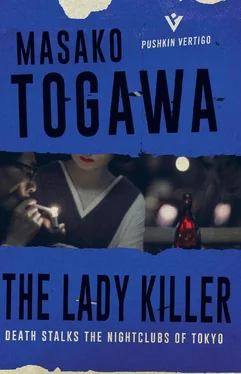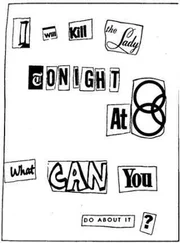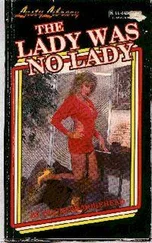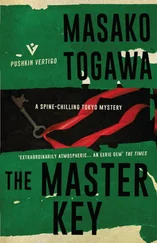“Let me tell you a little story. One summer’s evening just two years ago, Ichiro Honda was in that bar, singing the ‘Zigeunerliedchen.’ A girl joined him and sang with him. And they ended up spending the night together.”
“Where did they go? An inn?”
“Probably, but it is not relevant.”
Shinji felt the excitement welling up inside him; at the same time, he felt disgusted by Honda’s promiscuity.
“And let me tell you another little story. Six months later, there was a key-punch operator who took her own life; she fell from the window of an office building.” He drew heavily upon his cigar, blowing the purple cloud of smoke high toward the ceiling. “And the two stories are linked, for the girl was the same in each case. The girl who killed herself, and the girl who slept with Honda after singing ‘Zigeunerliedchen.’ One and the same—Keiko Obana, aged nineteen.”
“And was Honda the cause of her suicide?”
“No. She had become neurotic because of a vocational disease.” Shinji was listening attentively, but in place of the key-punch operator he was thinking of his former lover, the lending clerk in the library. She, too, had slept with Ichiro Honda, hadn’t she? He reflected bitterly upon his client.
Somewhere in the distance, he heard the old man continue. “Keiko Obana had an only sister, much older than she was.” Hatanaka’s voice was like a bee heard at a distance in a summer garden. “When Honda told me about Keiko Obana yesterday, I felt I had to go to the bar. So I went and sat in the box seat on the second floor where Honda said the girl was sitting before the singing began. After a little while, I heard the weeping strains of a violin from the ground floor, just as Honda had described to me. So I sent for the player and asked him to play ‘Zigeunerliedchen.’ The violinist, a bald old man, changed his expression sharply at my request.”
At last Hatanaka opened his sleepy eyelids and gazed at his junior. The old man’s voice began to take on an urgency that Shinji had never heard before.
“The player grinned at me in a crooked way and remarked, ‘Customers at Boi certainly like this song, don’t they, sir?’ I asked him what he meant, and he looked knowing and replied, ‘Next you are going to tell me that a thin girl occupied this seat and sang in chorus with a man downstairs. That would be right, wouldn’t it, sir?’” The old man stubbed out his cigar. “I asked if anyone else had put these questions to him, and he immediately answered that a woman had, about a year ago.”
Shinji felt as if he had suddenly been pulled from a dark coalhole into brilliant sunshine. He watched the old man’s lips as a gambler watches the dealer; it was as if two cards were about to be turned up, and they would both turn out to be the same.
“So I asked what the woman looked like. All he could remember was that she had a mole at the base of her nose, for the rest of her face was concealed by a wide-brimmed hat and sunglasses.”
Silence dominated the room. What had that woman with the mole been up to? Surely, Shinji thought, the old man was right; she was preparing to entrap Ichiro Honda.
“And what did the woman ask of the violinist?”
“The name of the man who had sung in union with the girl, and also the bars that he frequented.”
“And that was a year ago?”
“Yes. Just four months before the murder of Kimiko Tsuda at Kinshicho.”
“And who do you think she was?”
“I don’t know, but I have my suspicions. A relative of Keiko Obana’s, I’d say.”
“And the sister was the only relative?”
“Yes. I read up all the newspaper articles that came out at the time of the suicide. They were living together in an apartment at Omori. So I’ve sent a researcher off there to see what he can find.”
Shinji drew in his breath sharply, an involuntary sign of respect. The Hatanaka Law Office had found the trail, which would help it in its efforts to defend Ichiro Honda. It did indeed seem as if there was some connection between the key-puncher’s suicide and the murders. He saw in his mind’s eye those three faces: the worker at the film laboratory, the cosmetics salesman, the homosexual prostitute. Now they had to string together the moist episodes in the secret lives of these three men of a rare blood group and so prove Honda’s innocence.
The old man had again closed his eyes as if in sleep. Suddenly the phone on his desk rang with heart-stopping suddenness; the old man was shaken, for his hands trembled as he picked up the receiver.
The conversation was one-sided; occasionally, the old man would grunt or interject a terse word. Meanwhile, his right hand was engaged in scribbling on the memo pad in front of him. He replaced the receiver and lay back with his eyes closed, and Shinji knew better than to interrupt. After a while, the old man opened his eyes, lit a cigar and spoke.
“Keiko Obana’s sister moved from the Omori apartment last September. No one knows where she went, just that she moved. But all the people living around there describe her in the same way—a woman with a large mole on the right-hand side of her nose.”
“So that’s it; we’ve got her, haven’t we?”
“No. In addition to finding her, we’ve got to find a motive, and also how the crimes were committed.” The old man showed his normal prudence.
“She must have believed that her sister killed herself because of Honda deserting her.”
“I expect so.”
“So we must find out where the sister is.”
“That may not be so easy. However, I agree with you that we have no alternative.” The old man’s voice was suddenly tired, and Shinji could see why. A person capable of the cunning that had been used to trap Ichiro Honda would be no less capable of disappearing from the face of the earth once the plot was complete. If they failed to prove Honda’s innocence, and if he were executed, would the real criminal wallow in secret satisfaction? Or would he or she—and it seemed to be she—have killed herself by then?
The old man looked up at Shinji. “I’d like you to go to the police station that handled Keiko Obana’s suicide,” he said, half apologetically.
3
The M Police Station was housed in a gray building so dirty in color as to be almost sordid. Shinji reported to the policeman at the front desk and was kept waiting on a plain wooden bench in the entrance hall for some time. The section chief who had been in charge of Keiko Obana’s case was informing the relatives of the discovery of a drowned corpse in the palace moat that morning. Eventually he came out, conducting a matronly-looking woman whose eyes were red from weeping. She had a small baby on her back, poor soul, and Shinji reflected that those who are left behind always suffer most.
The section chief greeted him amiably and conducted him into his room. But when he heard that Shinji’s business concerned Keiko Obana, his face set in firm lines and he crossed his arms.
“It is correct that this station handled the suicide of Keiko Obana, a key-punch operator with K Life Insurance. We officially decided that the motive for suicide was neurosis caused by a vocational disease.” As he spoke, his eyes avoided Shinji’s; he stared at the wall or else widely over his shoulders, as if addressing a large audience. Shinji judged him to be an honest man who did not like telling lies.
“Yes, that’s very interesting, but apart from the official version, what else can you tell me—off the record, of course.” The section chief struggled with himself for a moment and then obviously decided there was nothing for it but to tell the truth.
“Well, there’s one thing I did not make public, and that was on my own responsibility. Keiko Obana was six months pregnant at the time of her death. I did not tell the press, and I hope you see why.”
Читать дальше












